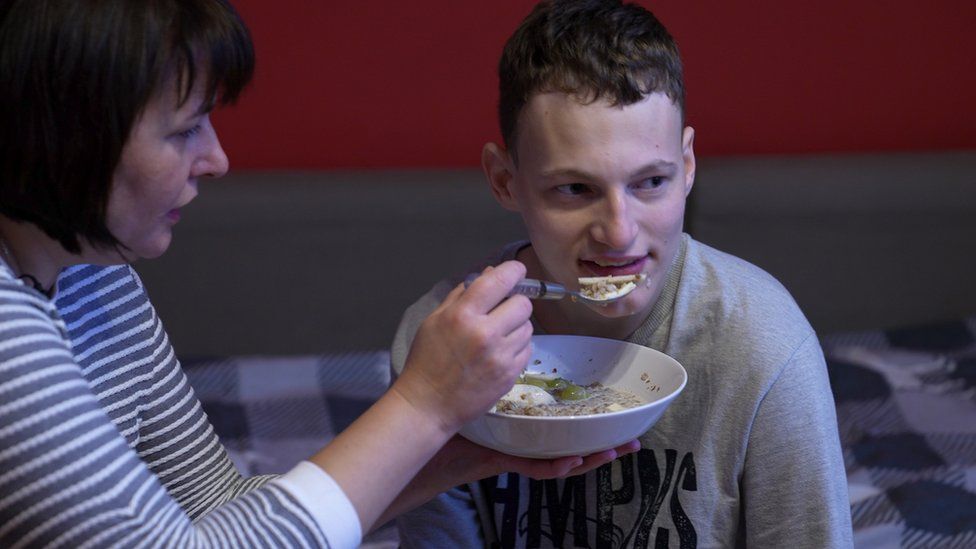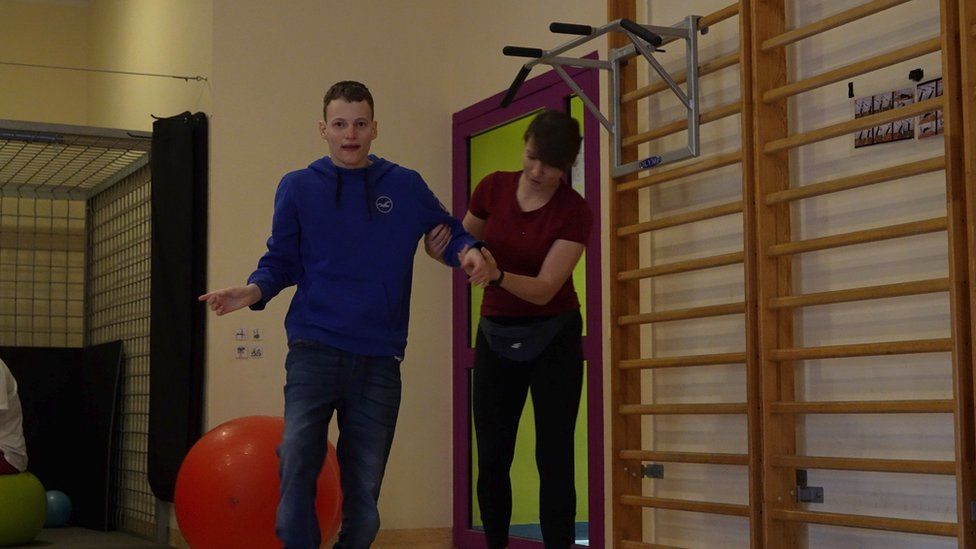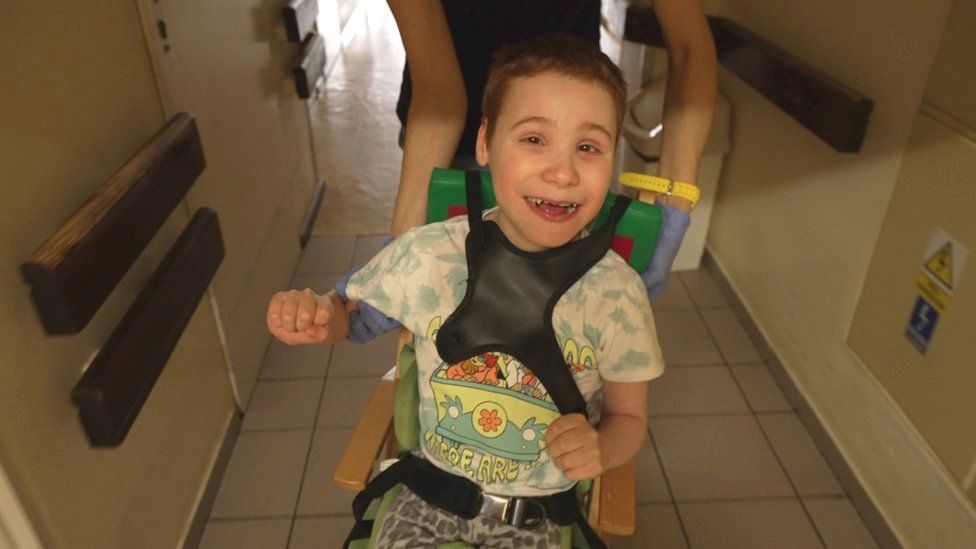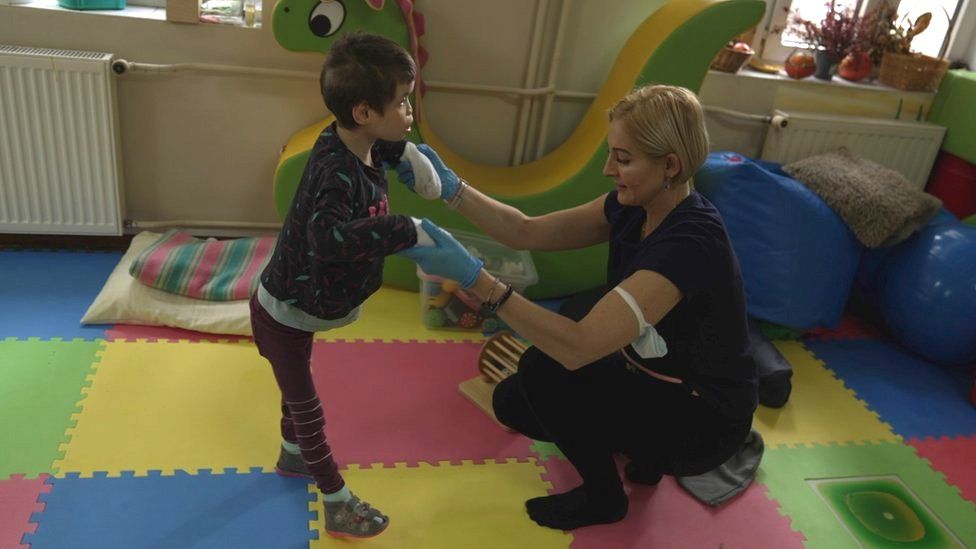BBC News 20 December 2022
When war broke out, millions of Ukrainians had to make a life-changing decision to flee their country - with many hoping to return as soon as possible. But for some disabled refugees, this displacement has offered new opportunities, and they now face a dilemma over whether to ever go home.
Nine months later, they are just some of the 1.4m refugees living in small apartments, rooms and shelters across Poland.
This means that their eldest son Roman, who has cerebral palsy and learning disabilities, has been given the chance to go to school for the first time. He is 20 years old.
"Back in Ukraine we were told he was unteachable, that there was no school for him," his mum Olga says as she makes packed lunches in the family's small kitchen.
For many disabled children and young people in Ukraine, access to education is rare. Before the war, fewer than 3% were enrolled in mainstream school.
Roman needs support to walk, and communicates through sounds and facial expressions. While he spent most of his life stuck at home, his younger sister, Sofia, was in full-time education. Now, in Poland, they both leave the house for school.
"Over the years that he didn't go to school, he lost a lot. And we lost a lot as a family," Olga says.
Widespread abuse
Back in Ukraine, Olga and her husband Volodymyr have had to fight to keep Roman from a life in an institution or a "psycho-neurological boarding facility". The authorities have spent two decades telling them that their son belongs in one of these places.
"They said, 'Give him away, you can always have another one,'" Olga says - the determination on her face making clear that this was never an option.
More than 50,000 disabled children and young people exist in this system - a network of more than 700 institutions. They are casualties of a Soviet era that encouraged parents to give their disabled child up to the state in the belief children receive better care in an institution.
A BBC News investigation in August uncovered widespread abuse in these establishments and the team were asked to give evidence at the United Nations.
Following that, UN experts demanded that the government urgently continue its de-institutionalisation process - returning children to families, increasing community support and closing facilities which abuse and neglect some of the most vulnerable in society.
Now in Poland, Roman starts his day with new purpose. Supported by his dad, he navigates the several flights of stairs from their small apartment in the suburbs of Krakow before a taxi takes him to a specialist school a few miles away.
There, his face lights up as his music therapy teacher plays the piano for him. She says the aggression he struggled to contain when he first came to the school back in March has left him, he's a "happy kid" who feels at ease and confident in this new environment.
He is given one-to-one support and physiotherapy in the school gym and his walking is steadily improving. For the first time, he can mix with his peers and learn new skills.
"I do not understand why he did not go to school in Ukraine," the head teacher, Urszula Majcher-Legawiec, says in one of the school's brightly-coloured corridors.
"We know his potential. Roman is constantly improving, he is learning new communication skills, he can tell us what he needs. A place like this is the best place for him."
"I am very proud of him that he goes to school," Olga beams. "He goes with pleasure."
Walking for the first time
A few hundred miles away in the north of Poland, I meet another 20-year-old refugee whose world is gradually expanding - but this time from the confines of his bed.
Ivan had spent his life lying down in an institution in the east of Ukraine. He is one of 60 disabled evacuees who fled their orphanage in Kharkiv just after the war broke out.
It was a gruelling 48-hour journey through Ukraine, during which some were tied to bus seats. Two of them did not survive.
"They were in a terrible condition," said Katarzyna Bogumila, a Polish volunteer who has helped care for them since they first arrived.
"They were really skinny. Like dry sticks, and I didn't think it was because of the war. They came to Poland at the end of February and it was just after the invasion. So it couldn't be that - it had to be like a system in Ukraine or something."
Ivan looks no older than a six-year-old, undernourished after two decades in confinement. His hair a flash of red against his pale skin.
Along with the other evacuees, his new home is a former psychiatric hospital in the city of Torun.
It has taken months to raise his fragile frame to a sitting position. If they elevated him too quickly there was a chance he could have had a stroke.
His view of the world has completely changed - he can now move around in a wheelchair, his face lights up as he is pushed to his physiotherapy. For the first time, he can see the lives of those around him.
Other children have also developed. Eleven-year-old Lillia, who has complex disabilities, is walking for the first time. One young man picks up a feather in the sensory room, an experience he has never had. The look of joy at his new-found capability glows on his face.
For Katarzyna, this is a short term solution. Her belief chimes with the UN experts who have criticised the Ukrainian government for insisting disabled children remain in a residential setting even when abroad, rather than being supported in the community. The government maintains it is the best way of being able to track the young evacuees and prevent trafficking.
"Every kid should have the chance to be with a family," she said.
"I'm hoping they're going to stay in Poland and we can find them families. I can see the difference being here is making every day. It's awesome. I feel like they're my own kids. I don't want to let them go."
But the situation is complex, illustrated by the dilemma facing the Kyrychenko family. Olga feels the pull of her homeland, but Poland offers so many opportunities for her son. She knows if they return to Ukraine his life will stagnate again.
"Our soul longs to go home while the brain says something different. For Roman, it is better here. It is amazing he can go to school here.
"It's hard to return from good to worse conditions, but abandoning Ukraine - our home is there. I just have to hope that maybe we can bring our experience back to Ukraine and a school for Roman could open there."




